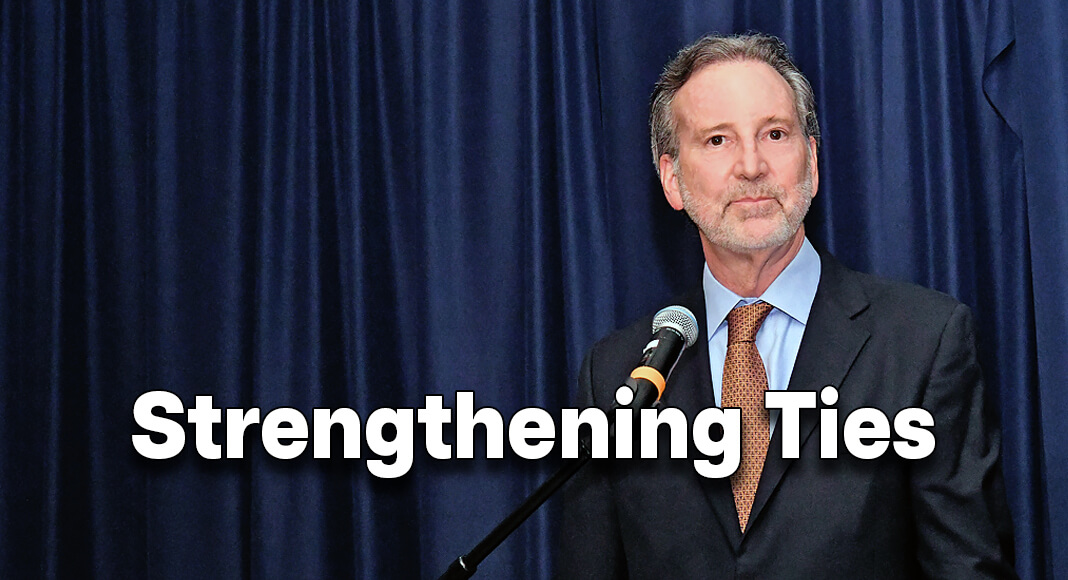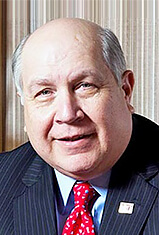
Texas Border Business
By Roberto Hugo González
The NADBank Summit 2024, held on August 29-30 in San Antonio, Texas, gathered thought leaders, policymakers, and business executives to address pressing environmental challenges and explore sustainable infrastructure development for the U.S.-Mexico border region.
Over the two-day event, key stakeholders from both sides of the border convened to exchange ideas and experiences on fostering a sustainable economy, strongly emphasizing innovative approaches to environmental preservation. The summit’s tone was set to reflect on past achievements and future challenges in bilateral trade. Gerald Schwebel, Executive Vice President of IBC Bank, moderated the discussions, which featured two notable figures: Antonio Garza, former U.S. Ambassador to Mexico, and Gerónimo Gutierrez Fernández, former Mexican Ambassador to the United States. This article focuses on the visions shared by Ambassador Garza regarding the evolution of trade agreements and their impact on US-Mexico relations.
Gerald Schwebel opened the session by acknowledging the deep history and significant milestones in the US-Mexico trade relationship, emphasizing the lasting impact of the North American Free Trade Agreement (NAFTA). “Today, I have the easiest job this morning because I’m sitting in the middle of two great friends, two great advocates for the US-Mexico relationship,” Schwebel stated, highlighting the friendship and shared experiences of the speakers. He stressed the importance of focusing on the positive aspects of trade, reflecting on the advancements and successes that have shaped the bilateral relationship over the past three decades.
Schwebel recounted, “Looking back in 1994, a lot of great things happened. And among them is the implementation of the North American free-trade agreement, which eventually became the USMCA.” He reminded the audience of the historical significance of the original NAFTA agreement, its challenges, and its evolution into the modernized USMCA. Schwebel’s remarks set the stage for a deeper exploration of the trade agreements’ historical context and broader economic and social implications.
Ambassador Antonio Garza took the floor to share his experiences and perspectives on the evolution of US-Mexico trade relations. Reflecting on his tenure as the U.S. Ambassador to Mexico from 2002 to 2009, Garza offered a nuanced view of the complexities of managing bilateral ties during a time of significant economic and political change. “That’s a big open-ended question, and I like those because that means I can go in any direction I want, and it’ll pass as an answer,” Garza joked, setting a reflective yet candid tone for his remarks.
Garza emphasized the human aspect of trade agreements, urging policymakers and stakeholders to see beyond the numbers. “From my perspective of having grown up in county government, all those numbers are faces,” he remarked. He highlighted the tangible impacts of trade policies on individuals and communities, from infrastructure projects to job creation. “A water project is a child’s health. A road project is the ability to move that school bus to and from school, an education. Clean air is the future,” Garza explained, stressing the need to connect policy decisions with their real-world consequences.
Garza’s insights also shed light on the inherent challenges of trade negotiations and the sustained efforts required to achieve progress. He noted that reaching consensus and implementing agreements like NAFTA demanded substantial political capital and perseverance even with favorable political climates, such as the “enormous tailwinds” of the late 1980s and 1990s. “Imagine that even with all those tailwinds at the leadership level, it was still a grind,” he said, referencing the complex negotiations and political maneuvering involved.
He also reflected on the evolving challenges in US-Mexico relations, particularly the rise of populism and protectionism. “What we face today are significant headwinds,” Garza observed, pointing to the increasing nationalism and nativism in both countries. He argued that these sentiments complicate efforts to advocate for free trade and economic integration but also reiterated the importance of continuing the fight. “This stuff is never easy, but it’s always worth it,” he asserted, calling for a renewed commitment to fostering strong bilateral ties.
Throughout his remarks, Garza emphasized the critical role of leadership and sustained advocacy in advancing trade relations. He recalled his experiences working on long-term projects, such as international bridge initiatives, which required decades of effort and multiple generations of leaders to bring to fruition. “It takes not just leaders, but generations of leaders committed to these sorts of things to make them happen,” he noted, highlighting the importance of persistence and long-term vision in policymaking.
Schwebel echoed this sentiment, highlighting the legislative challenges of passing trade agreements. He recounted the narrow margins by which NAFTA was approved, emphasizing the importance of having the right people in the right places to support these initiatives. “You were there as an ambassador where Texas delivered all of its delegations to vote and support of USMCA,” Schwebel said, acknowledging the critical role of political support in achieving trade successes.
As the NADBank Summit discussions continued, it was clear that the future of US-Mexico trade relations would require continued collaboration, adaptation, and advocacy. Both Garza and Schwebel highlighted the importance of recognizing the more significant impacts of trade agreements and maintaining a focus on shared economic growth and development. The evolution from NAFTA to USMCA represents a commitment to refining and modernizing trade frameworks to serve both nations’ needs better.
The NADBank Summit 2024 was a critical platform for discussing trade, pressing environmental challenges, and sustainable infrastructure development for the U.S.-Mexico border region. As Ambassador Garza aptly put it, “If we fight that battle, it’s not only sleeves rolled up day in and day out along the border and supportive of organizations like NADBank, but it’s day in and day out sleeves rolled up in Washington and Mexico City.” The path forward may be challenging, but the commitment to fostering a strong and mutually beneficial relationship remains firm.
The discussions at the summit featured a clear message: building a sustainable and economically vibrant future requires a concerted effort from all stakeholders, including governments, businesses, and local communities, to overcome obstacles and seize opportunities. The dedication shown at the NADBank Summit 2024 promises to be a cornerstone for continued growth and cooperation between the United States and Mexico.
See related stories:














